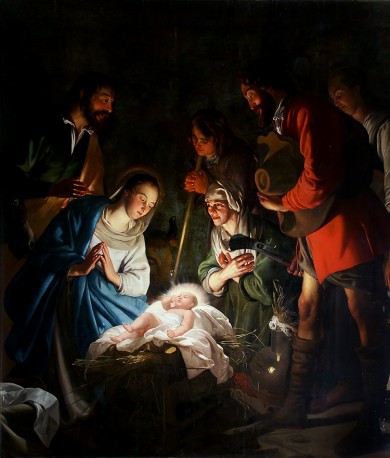Superb soloists lift Seraphic Fire’s “Messiah”
Handel’s Messiah has long been a holiday season perennial and Seraphic Fire’s annual performances have become a South Florida Christmas tradition. While audiences are still waiting for Patrick Dupre Quigley to conduct the complete oratorio, this year’s edition featured more of the score than in the past.
On Friday night at All Saints Episcopal Church in Fort Lauderdale, Quigley led most of the Nativity section and 13 choruses and arias from the remaining two parts of the score.
In past years, Quigley’s performances have firmly adhered to brisk tempos and vibrato-less vocalism and instrumental playing. (Last year’s performances directed by associate conductor James K. Bass were a marked contrast, with more relaxed tempos and expressive singing less influenced by period performance practice.)
Friday’s performance showed Quigley’s most imaginative rendering of Handel’s masterpiece to date, opting for a more varied approach and with flexible pacing that showed greater attention to the text.
The more measured tempo of the chorus “And the Glory of the Lord” allowed for clearer choral articulation and the surprisingly soft ending was highly effective. The light choral sonority and sprightly pace of “And he shall purify” was delightfully fresh. Male voices were particularly precise for “Unto Us a Child is Born,” with the instrumental lines highly transparent.
Quigley unleashed the choir’s full sonority in “Surely he hath Borne our Grief” and “Worthy is the Lamb.” Blending of vocal timbres was wonderfully smooth and mellow, the choir turning on a dime from soft, carefully nuanced singing to full-throated proclamations.
Quigley fielded what may have been his best group of Messiah vocal soloists yet. Countertenor Douglas Dodson brought strong, beautiful vocalism, a fine sense of musical line and spot-on intonation to “But who may abide.”
The remarkable Kathryn Mueller goes from strength to strength. She displayed wonderful agility and freedom in the upper register for “Rejoice greatly.” The soprano’s interpolated high notes and cadenza near the end of the aria were totally idiomatic. “I Know that my Redeemer Liveth” was even more beautifully sung, with Mueller’s graceful shaping of the melody and soft rendering of the final verse deeply moving.
Steven Soph’s nimble coloratura and individual ornamentation enlivened “Every valley.” Bass’s powerful bass voice, commanding textural authority and perfect trills highlighted a dynamic “The Trumpet shall Sound” with Brian Shaw’s bugle-like Baroque trumpet adding a distinctive obbligato.
The contrast between Margaret Lias’ voluminous, operatic mezzo and Brenna Wells’ ethereal high soprano gave variety to “He Shall Feed his Flock,” with Quigley adopting an unusually slow tempo that benefited the singers. Brad Diamond’s fine lyric tenor sound was matched by vocal drama in a fiery “Thou Shall break Them.”
After the fine showing by The Sebastians at Seraphic Fire’s program last month, it was disconcerting to hear such a rough, coarse corporate sound from the same period-instrument ensemble with repeated intonation problems in the overture. Things improved as the performance gained momentum but there were still occasional instrumental blemishes, suggesting extra orchestral rehearsals may have been in order.
Leon Schelhase’s harpsichord and Hannah Collins’ cello added an incisive, vibrant continuo. Bolstered by the presence of UM Frost School of Music faculty member Craig Morris, trumpets blared triumphantly in the Hallelujah chorus and finale with Quigley adding trumpets to the oboe line in a festive “Glory to God.”
Handel’s Messiah will be repeated 8 p.m. Saturday at Miami Shores Presbyterian Church and 4 p.m. Sunday at South Miami-Dade Cultural Arts Center in Cutler Bay. seraphicfire.org.
Posted in Performances
One Response to “Superb soloists lift Seraphic Fire’s “Messiah””
Leave a Comment
Sat Dec 19, 2015
at 11:25 am
1 Comment








Posted Dec 19, 2015 at 3:55 pm by John Smith
Mr. Budmen, I’d encourage you to review your Messiah score. “Glory to God” as Handel wrote it has (two) independent trumpet parts. Maestro Quigley did not “add” the trumpets to the oboe line.
What does it mean to add a “distinctive obbligato”? Isn’t an obbligato line, by its very nature, “distinctive”? Is there such a thing as an indistinct obbligato?